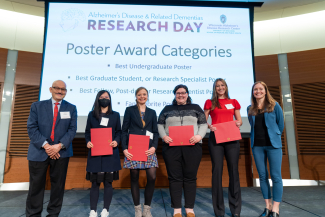
The Wisconsin Alzheimer’s Disease Research Center hosted its annual Alzheimer’s Disease and Related Dementias Research Day on April 5, 2022, at the Discovery Building on the UW–Madison campus and virtually. More than 220 people attended the half-day event, either in person or online.
The research day poster session included 43 poster presenters. A group of faculty researchers judged the posters. The following is a list of poster abstract award winners:
- Best Fellow, Post Doc, or Research Scientist Poster: Natascha Merten, “Associations of Sensory and Motor Functions in Midlife with Longitudinal Blood-Based Biomarker Levels of Alzheimer's Disease and Neurodegeneration”
- Best Graduate Student or Research Specialist Poster: Katie Zarbock, “Trimethylamine N-oxide reduces plaque intensity and neurite density in 5XFAD murine Alzheimer's disease model”
- Best Undergraduate Student Poster: Brook Schroeder, “Antemortem-postmortem correlates of 4D-Flow MRI in cerebral vessels”
New this year was our first-ever Fan Favorite Poster Award. In-person attendees were able to vote for their favorite poster presentation during the event. Our Fan Favorite Poster Award went to:
- Lianlian Du, “Trajectories of cognitive performance in late middle-aged adults: Bayesian random change point mixed model analysis in WRAP”
Presentations
Research day keynote speaker Thomas Karikari, PhD, University of Gothenburg and University of Pittsburgh, offered a presentation on blood biomarkers for Alzheimer’s disease. Karikari emphasized that the future is promising for blood-based biomarkers, but there is still a lot of research that needs to be done. You can view a recording of his keynote address on the Wisconsin ADRC YouTube channel and listen to him on the Dementia Matters podcast episode “Update on Blood Tests for Alzheimer’s Disease.”
Wisconsin ADRC REC Scholar and Alzheimer’s disease researcher Anita Bhattacharyya, PhD, was the featured speaker. The Waisman Center investigator gave a talk about her research on Alzheimer’s disease and Down syndrome. Individuals with Down syndrome have an extra copy of chromosome 21, and some Alzheimer's disease-related genes are on chromosome 21. Watch her presentation on the Wisconsin ADRC YouTube channel.
Five abstract submissions to the poster session were chosen for oral abstract presentations. The following is a list of the Lightning Presenters and their abstract titles:
- Hailey Feinzig, undergraduate neurobiology honors student in the College of Letters and Science, “The Impact of APP C-terminal Editing on Endosomal/Lysosomal Pathway Dysfunction in Down Syndrome Fibroblasts”
- Saniya Khullar, PhD student in biomedical data science, “Multi-omics Gene Regulatory Networks Linking Risk SNPs and Neuroimmunology to Alzheimer’s Phenotypes”
- Akshay Kohli, PhD student in neuroscience training program, “Higher Cortical Myelin Is Associated with Worse Performance on Cognitive Tests: Findings from the Alzheimer’s Disease Connectome Project”
- Alexis R. Nelson, undergraduate neurobiology and psychology student, “The Association of Vascular Endothelial Growth Factor and Vascular Resistance in Individuals at Risk for Alzheimer’s Disease”
- Adrienne L. Johnson, PhD, assistant professor, University of Wisconsin School of Medicine and Public Health Department of Medicine and Center for Tobacco Research and Intervention, “Motivating Alzheimer’s Disease and Related Dementia Risk Reduction Behaviors in Older Adults: Motivational Cessation Message Development Findings”
You can view a video of the Lightning Presenters’ presentations on the Wisconsin ADRC YouTube channel.
Photo caption: 2022 Alzheimer's Disease & Related Disorders Research Day poster session winners are pictured here with Wisconsin ADRC leadership. From left to right: Sanjay Asthana, MD, Wisconsin ADRC director; Lianlian Du; Natascha Merten; Katie Zarbock; Brook Schroeder; Barbara Bendlin, PhD, Wisconsin ADRC Research Education Component (REC) leader.



